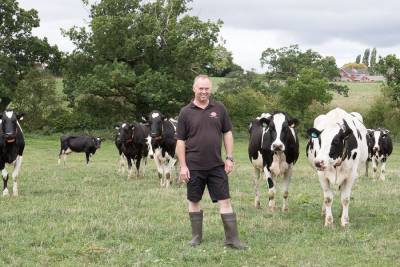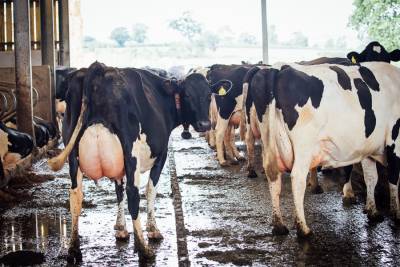

The British Cattle Breeders Club members enjoyed an insight into two fabulous dairy units in Shropshire in early August.
Our first visit was to Bridge Farm, Edstaston by kind permission of Neale Sadler, a small family dairy farm milking 70 Holstein cows, with 90 heifer replacements and 25 beef stores. At 85m above sea level with between 760-1000mm annual rainfall, Neale farms over 200 acres, growing a variety of crops for feed with grass, maize, winter wheat, winter oats and lucerne. Alongside the family farm Neale runs a successful contract baling business.
In 2003 Neale and his father ceased milking due to staff and infrastructure issues, and after extensive research and planning Neale resumed milking again in 2006, this time through an A3 Lely Robot. The cows were originally housed on a straw yard, but Neale found this didn’t suit the system or the cows, the distance to the robot and mastitis were the main issues. Neale converted an existing building into a slatted yard with cubicles and built an underground slurry store. The mastitis problem disappeared but did find cows slipping a problem. Rubber matting was installed and massively improved fertility and yields, the cows were visiting the robot more regularly (on average 3x a day) and showed natural signs of heat. The cows have the benefit of being able to graze once they have been milked by using the grazeway gate, other technology used includes the discovery barn cleaner, lunar brush and out of parlour feeders.
Neale said ‘installing the robot was one of the best decisions ever made’ adding ‘the cows are in a stress-free environment and by decreasing the stress thus increasing fertility and performance.’
In May 2012 Neale was producing milk on a Muller contract and during that summer he decided to test the whole herd for the A2 variety of beta casein protein - 43% of the herd tested were A2 cows, compared to an average of 33% in other herds. Neale sold the non A2 cows and slowly built up the herd to become 100% A2 cows and started supplying the a2 company with A2 milk.
Neale explained that ‘milk can contain A1 and A2 varieties of beta casein, however the A2 variety is better for lactose intolerant people’ he added ‘that generally a third of cows will be A2:A2, a third A1:A2 and the other third A1:A1’. The A2 milk his cows produce doesn’t contain the A1 protein which 1 in 5 people find difficult to break down’. Neale concluded ‘in my personal experience of drinking only A2 milk I have noticed that the eczema I had has disappeared.’
Neale currently tests all of his calves at birth for the A2 protein which is tested and paid for through Muller. Neale receives 2.5ppl above the standard milk price on the milk that is retailed as A2. The management system of his cows is still the same the only difference is when selecting sires to ensure they are A2 certified.
Our second visit took us to Meadow Bank Farm near Cantlop, by kind permission of Steve and Ruth Ashley, another family run dairy unit running a closed herd of 130 Holstein cows and rearing all replacements. The farm consists of 113 acres owned and around 300 acres rented, growing maize, whole crop, multi-cut silage, hay and haylage.
The cows are milked through two A2 Lely Astronaut robots, the first robot was installed in 2013 with the second in 2017. The barn is split into two halves, with a robot on each side. The cows are currently averaging 45 litres a day and have reached 50 litres a day during other times of the year, averaging 13,500 to 14,000 litres. The herd was the 5th highest performing Lely robot milked herd in the world. The herd is all year-round calving with the cows housed and on average visiting the robot 3.7 times a day. The cubicles are sand bedded and topped up weekly whilst the cows are being fed.
Ruth and Steve, along with their herdsman, John, meticulously study the health reports provided by the robots and the cows looked at routinely every morning, Ruth explained ‘you have got to use the data, healthy cows equals milk production’. The rumination data is regularly monitored, along with ketosis and acidosis. Regular vet visits and foot trimming are also part of the on going health monitoring of the herd. All calves are BVD tag and tested and johnes is monitored quarterly through milk samples with high reading cows no longer bred from.
Sexed semen is used on their heifers and the best producing cows in the herd, calving the heifers at 23-24 months. When choosing sires Ruth focuses on health, fertility, mobility, calving ease and milking speed. The herd currently has a 396 day calving interval with 33% PD+ at first service and 91% in calf by 100 days in milk.
Steve and Ruth have a meticulous long-term plan with continuous improvement and when asked if they will look at adding a third robot, Steve replied ‘we are planning for a third within the next 10 years but we need to ensure we have everything else right first’ he concluded ‘that the next building will be a dry cow shed.’
Both farms gave an incredible insight into two different dairy units, both looking ahead to a future in the dairy industry and ensuring that they continue to maintain high standards within health and welfare of their herds, and providing a stress-free environment whilst continuing to provide a healthy end product.
Grateful thanks to Lely for providing lunch.